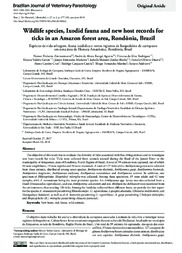Wildlife species, Ixodid fauna and new host records for ticks in an Amazon forest area, Rondônia, Brazil.
Wildlife species, Ixodid fauna and new host records for ticks in an Amazon forest area, Rondônia, Brazil.
Author(s): ZIMMERMANN, N. P.; AGUIRRE, A. de A. R.; RODRIGUES, V. da S.; GARCIA, M. V.; MEDEIROS, J. F.; BLECHA, I. M. Z.; DUARTE, P. O.; CRUZ, B. C.; CUNHA, R. C.; MARTINS, T. F.; ANDREOTTI, R.
Summary: The objective of this work was to evaluate the diversity of ticks associated with free-living animals and to investigate new host records for ticks. Ticks were collected from animals rescued during the flood of the Jamari River in the municipality of Ariquemes, state of Rondônia, North Region of Brazil. A total of 39 animals were captured, out of which 10 were amphibians, 19 were reptiles and 10 were mammals. A total of 127 ticks of the Amblyomma genus were collected from these animals, distributed among seven species: Amblyomma dissimile, Amblyomma geayi, Amblyomma humerale, Amblyomma longirostre, Amblyomma nodosum, Amblyomma rotundatum and Amblyomma varium. In addition, one specimen of Rhipicephalus (Boophilus) microplus was collected. Among these specimens, 85 were adults and 42 were nymphs, with A. rotundatum being the most prevalent species. An Amblyomma spp. larvae was also collected from a lizard (Uranoscodon superciliosus), and one Amblyomma calcaratum and one Amblyomma dubitatum were recovered from the environment, thus totaling 130 ticks. Among the Ixodidae collected from different hosts, we provide the first report for the species A. rotundatum parasitizing Rhinella major, U. superciliosus, Leptophis ahaetulla, Chironius multiventris, and Mastigodryas boddaerti, as well as of A. humerale parasitizing U. superciliosus, A. geayi parasitizing Choloepus didactylus, and Rhipicephalus (B.) microplus parasitizing Alouatta puruensis.
Publication year: 2018
Types of publication: Journal article
Unit: Embrapa Beef Cattle
Keywords: Animal Selvagem, Fauna ixodídica, Hospedeiro, New hosts, Tick fauna, Wild animals
Observation
Some of Embrapa's publications are published as ePub files. To read them, use or download one of the following free software options to your computer or mobile device. Android: Google Play Books; IOS: iBooks; Windows and Linux: Calibre.
Access other publications
Access the Agricultural Research Database (BDPA) to consult Embrapa's full library collection and records.
Visit Embrapa Bookstore to purchase books and other publications sold by Embrapa.

